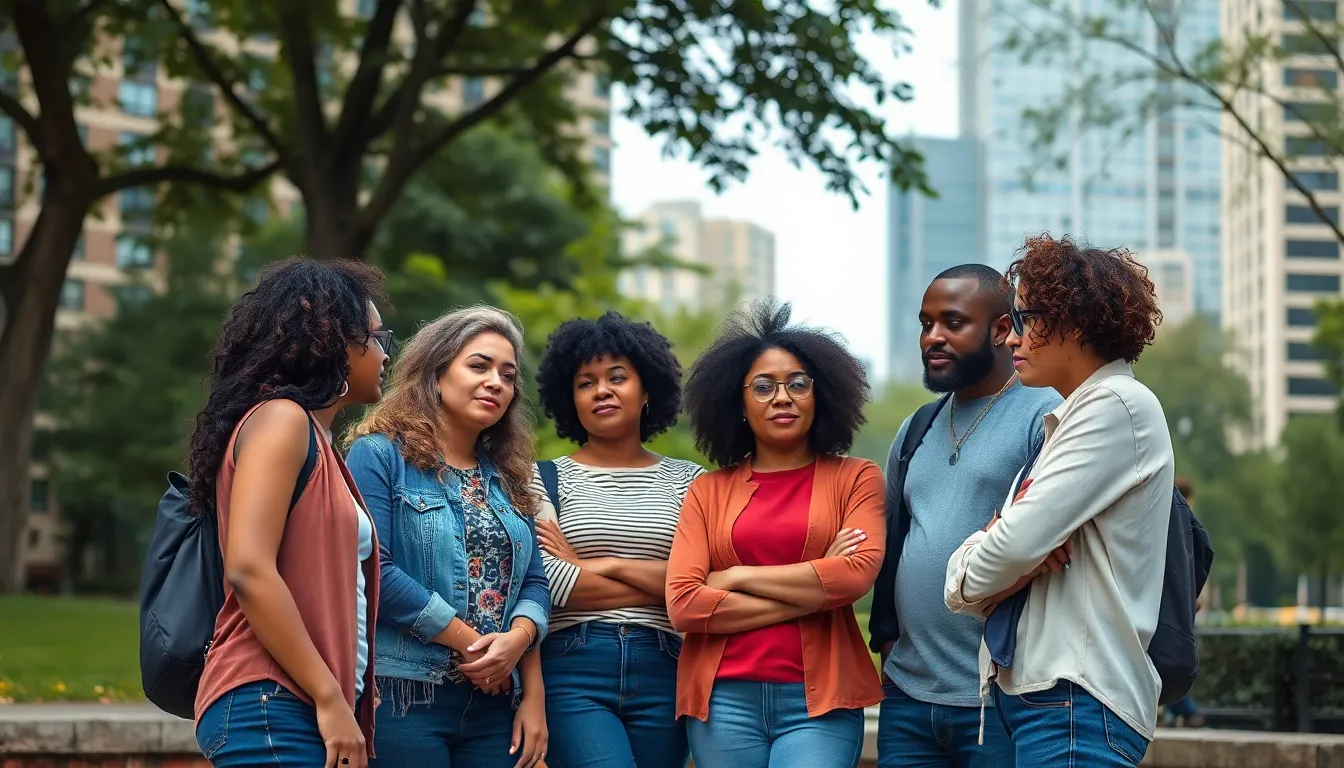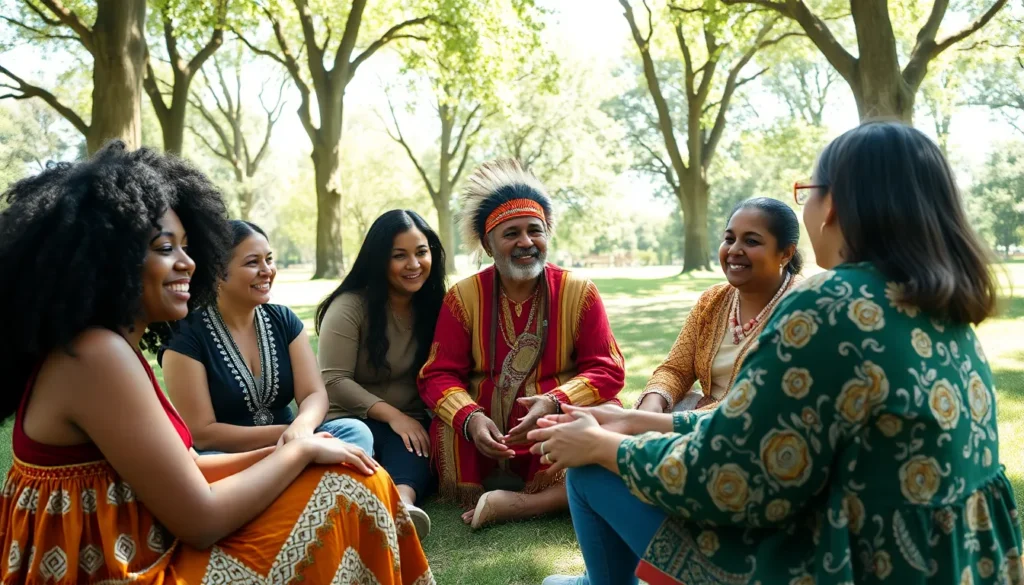Mental health is a universal concern, but for BIPOC communities, it often comes with unique challenges that can feel like navigating a maze blindfolded. From cultural stigma to systemic barriers, the journey to mental well-being can be a rollercoaster ride—minus the fun. It’s time to shine a light on these issues because mental health shouldn’t be a privilege; it should be a right for everyone.
Understanding BIPOC mental health isn’t just about statistics or studies; it’s about real people facing real struggles. This article dives into the nuances of mental health in BIPOC communities, exploring the intersection of culture, identity, and wellness. So grab your favorite snack and get comfy, because it’s time to unpack this critical topic with a sprinkle of humor and a whole lot of heart.
Table of Contents
ToggleUnderstanding BIPOC Mental Health
BIPOC mental health encompasses the unique psychological well-being of Black, Indigenous, and People of Color. Recognizing and addressing mental health in these communities is crucial for promoting overall wellness.
Definition and Importance
BIPOC mental health refers specifically to the emotional and psychological health issues affecting individuals in these communities. Culturally relevant resources and care are vital for supporting these populations. Proper recognition of BIPOC mental health fosters understanding and encourages individuals to seek help without fear of stigma. Researchers emphasize that mental health disparities result from historic trauma and systemic inequities. Prioritizing mental health accessibility for BIPOC individuals can lead to stronger, healthier communities.
Unique Challenges Faced by BIPOC Communities
BIPOC individuals often encounter systemic barriers within healthcare systems. Cultural stigma surrounding mental health may deter individuals from seeking help. Limited representation in mental health professions exacerbates these challenges. Many face economic hardships that complicate access to necessary resources. Racial discrimination and microaggressions contribute to adverse mental health outcomes. Research indicates that these interconnected stressors create cumulative effects on overall well-being. Understanding the unique challenges faced by BIPOC communities is essential in developing effective, culturally competent interventions.
Historical Context

BIPOC mental health has deep roots in historical injustices. Understanding this context reveals the unique challenges these communities face today.
Systemic Racism and Mental Health
Systemic racism creates profound barriers to mental health access for BIPOC individuals. Data shows that historic inequalities in healthcare exacerbate mental health conditions. Inequity in income and education leads to higher stress levels, disproportionately affecting these populations. Those dealing with racial discrimination often experience anxiety, depression, and trauma at elevated rates. Research indicates that marginalized communities are less likely to receive culturally competent mental health care. This lack of appropriate resources prevents individuals from seeking help. Recognizing these systemic issues is crucial for addressing mental health disparities among BIPOC populations.
Cultural Stigma and Its Impact
Cultural stigma around mental health significantly affects BIPOC communities. Many individuals perceive mental health issues as a weakness, discouraging open discussions. Silence around mental health struggles can lead to untreated conditions. Familial expectations and community beliefs often prioritize resilience over vulnerability. This stigma affects the willingness to seek help, contributing to higher rates of mental health issues. Various studies highlight that BIPOC youth face increased pressure to conform to these cultural expectations. Awareness and education are vital to dismantling this stigma and promoting mental well-being in BIPOC communities.
Current Statistics and Trends
BIPOC communities face significant mental health challenges, underscored by alarming statistics. Mental health issues considerably affect these groups, leading to a rising need for discussion and support.
Prevalence of Mental Health Issues
Research indicates that BIPOC individuals experience higher rates of mental health issues compared to their white counterparts. A 2020 study found that 48% of Black adults reported symptoms of anxiety or depression. Additionally, Indigenous people often encounter mental health issues related to historical trauma, with 25% experiencing suicidal thoughts. Asian Americans also report similar struggles, where 30% indicate feeling depressed or anxious. These statistics reveal a pressing need for targeted mental health resources within these communities.
Access to Mental Health Resources
Barriers to accessing mental health services persist for BIPOC individuals. According to the National Alliance on Mental Illness, only 33% of Hispanic adults receive proper treatment. Similarly, 40% of Black adults who recognize the need for mental health assistance face obstacles like cultural stigma or economic hardships. Moreover, Indigenous communities experience underfunding for mental health programs, limiting their access to crucial support. Challenges such as these underscore the urgent need for culturally competent care and targeted interventions, promoting mental wellness across diverse communities.
BIPOC Mental Health Practices
BIPOC mental health practices focus on the unique needs and cultural contexts of these communities. Emphasizing accessibility and relevance, these approaches bridge gaps in traditional mental health care.
Culturally Responsive Therapy
Culturally responsive therapy integrates clients’ cultural identities into treatment. This approach fosters a deeper understanding and connection between therapists and BIPOC individuals. By recognizing cultural differences, therapists can tailor interventions to resonate with clients. Data shows that engaging with culturally competent care improves treatment outcomes. For example, 55% of BIPOC individuals report feeling more comfortable discussing their mental health when therapists understand their cultural context. Using culturally specific coping strategies enhances trust, encouraging clients to explore their emotions openly.
Community-Based Support Systems
Community-based support systems strengthen mental health within BIPOC populations. These systems create safe spaces for dialogue around mental wellness. Utilizing traditional practices and peer support leads to healthier communities. Local organizations often provide resources that resonate with cultural values and beliefs. Research indicates that 60% of BIPOC individuals prefer seeking help from community members over mental health professionals. Increasing awareness of these resources enhances the overall mental health landscape, promoting resilience and well-being among BIPOC communities. With accessible services, communities can collectively address mental health challenges effectively.
Advocacy and Policy Changes
Addressing BIPOC mental health requires significant advocacy and policy changes rooted in the unique challenges these communities face.
Importance of Representation
Representation in mental health professions impacts the quality of care for BIPOC individuals. It enhances accessibility as diverse practitioners can relate to clients’ experiences. Engaging with therapists who share similar cultural backgrounds fosters trust. Trust plays a vital role in encouraging individuals to seek help. When personal experiences resonate with professional guidance, the treatment process benefits. Statistics indicate that 55% of BIPOC individuals feel comfortable discussing mental health with culturally competent therapists. Prioritizing diversity in mental health fields leads to improved outcomes. Community-specific representation not only builds rapport but also validates unique cultural narratives.
Efforts to Improve Mental Health Care
Multiple initiatives aim to enhance mental health care access for BIPOC populations. Programs focused on culturally responsive therapy train professionals in cultural competence and sensitivity. Efforts emphasize the integration of traditional practices alongside conventional therapies. Funding from public and private entities seeks to address underfunding issues related to Indigenous populations. Innovative approaches, such as telehealth, expand reach to underserved communities. Community-based organizations also play a crucial role by providing peer support and safe spaces for discussions. Research shows that 60% of BIPOC individuals prefer seeking support from community members. Committing resources to improve mental health services ensures that BIPOC communities access vital care.
Addressing BIPOC mental health requires a multifaceted approach that recognizes the unique challenges these communities face. It’s essential to dismantle cultural stigma and systemic barriers while promoting access to culturally competent care. By fostering community support and advocating for policy changes, society can create an environment where mental health is prioritized and accessible for all.
The path to improved mental wellness within BIPOC populations hinges on understanding and addressing their specific needs. Continued awareness and education will empower individuals to seek help and embrace their mental health journeys without fear or hesitation. Together, these efforts can pave the way for healthier, more resilient communities.



